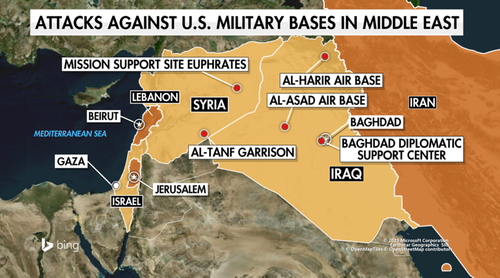
The Saturday evening fireworks show in the Middle East marked Tehran's first full-scale military attack on Israel. Although largely unsuccessful, concerns mount that US military bases in the region might be targeted with ballistic missiles and suicide drones if the US supports an Israeli retaliation strike.
Israel Defense Forces spokesman Daniel Hagari told The Washington Post that Iran launched 300 drones and missiles at Israel, adding that "more than 99 percent" had been intercepted by either Israel or the US. President Biden condemned Tehran's "brazen attack" on Israel and told Israeli Prime Minister Benjamin Netanyahu about America's "ironclad commitment" to Israel's security. However, the US president warned Netanyahu that the US won't support counterattack strikes against Iran.
Ahron Bregman, a political scientist and expert in Middle East security issues at King's College in London, told The New York Times that Iran's direct attack on Israel last night was the first of its kind from its own territory, calling it a "historic event."
Over the years, Tehran has used foreign proxies such as Lebanon's Hezbollah militia and Yemen's Houthi rebels to strike Israeli interests. At the moment, the Houthis are targeting US, UK, and Israeli-affiliated commercial vessels in the Southern Red Sea. And early Saturday, Iran seized an Israeli-affiliated container ship near the Strait of Hormuz.
Tehran's attack on Israel is a major escalation. There are mounting concerns that Israel could strike back. If so, Iran warned Washington that US military bases could be in the crosshairs of missiles and suicide drones.
"Our response will be much larger than tonight's military action if Israel retaliates against Iran," Iran's armed forces chief of staff, Major General Mohammad Bagheri, told state media, as quoted by The Times of Israel. He said that Tehran warned Washington that any backing of an Israeli retaliation strike would result in US bases being targeted.
"If the Zionist regime (Israel) or its supporters demonstrate reckless behavior, they will receive a decisive and much stronger response," Iran's president Ebrahim Raisi said in a statement.
Even before the attack, US bases in Iraq and Syria were peppered with attacks by Iran-backed militias. AP News said these bases were attacked more than 150 times since Oct. 7.
Meanwhile, Iran's Fars news agency spoke with a "source" who said Iranian military officials are closely monitoring developments in Jordan, which could be the next area to target.
Earlier this year, Iran-backed militias attacked a US base in northeast Jordan near the Syrian border with a drone that killed three US troops and injured three dozen.
Remember the discussion former NATO Supreme Allied Commander Wesley Clark had with CNBC on Friday, where he mentioned that a "direct strike on Israel" by Iran could compel the Israeli Air Force to target "nuclear assets" in the country?
Israel reportedly preparing for an imminent attack by Iran this weekend, according to reports.
— CNBC's Fast Money (@CNBCFastMoney) April 12, 2024
Former NATO Supreme Allied Commander Wesley Clark predicts that if Iran does something it will be minor. He also runs through the different scenarios. pic.twitter.com/CetrfrDLHn
The Middle East is entering uncharted territory where the next major conflict could be imminent.
The Saturday evening fireworks show in the Middle East marked Tehran’s first full-scale military attack on Israel. Although largely unsuccessful, concerns mount that US military bases in the region might be targeted with ballistic missiles and suicide drones if the US supports an Israeli retaliation strike.
Israel Defense Forces spokesman Daniel Hagari told The Washington Post that Iran launched 300 drones and missiles at Israel, adding that “more than 99 percent” had been intercepted by either Israel or the US. President Biden condemned Tehran’s “brazen attack” on Israel and told Israeli Prime Minister Benjamin Netanyahu about America’s “ironclad commitment” to Israel’s security. However, the US president warned Netanyahu that the US won’t support counterattack strikes against Iran.
Ahron Bregman, a political scientist and expert in Middle East security issues at King’s College in London, told The New York Times that Iran’s direct attack on Israel last night was the first of its kind from its own territory, calling it a “historic event.”
Over the years, Tehran has used foreign proxies such as Lebanon’s Hezbollah militia and Yemen’s Houthi rebels to strike Israeli interests. At the moment, the Houthis are targeting US, UK, and Israeli-affiliated commercial vessels in the Southern Red Sea. And early Saturday, Iran seized an Israeli-affiliated container ship near the Strait of Hormuz.
Tehran’s attack on Israel is a major escalation. There are mounting concerns that Israel could strike back. If so, Iran warned Washington that US military bases could be in the crosshairs of missiles and suicide drones.
“Our response will be much larger than tonight’s military action if Israel retaliates against Iran,” Iran’s armed forces chief of staff, Major General Mohammad Bagheri, told state media, as quoted by The Times of Israel. He said that Tehran warned Washington that any backing of an Israeli retaliation strike would result in US bases being targeted.
“If the Zionist regime (Israel) or its supporters demonstrate reckless behavior, they will receive a decisive and much stronger response,” Iran’s president Ebrahim Raisi said in a statement.
Even before the attack, US bases in Iraq and Syria were peppered with attacks by Iran-backed militias. AP News said these bases were attacked more than 150 times since Oct. 7.
Meanwhile, Iran’s Fars news agency spoke with a “source” who said Iranian military officials are closely monitoring developments in Jordan, which could be the next area to target.
Earlier this year, Iran-backed militias attacked a US base in northeast Jordan near the Syrian border with a drone that killed three US troops and injured three dozen.
Remember the discussion former NATO Supreme Allied Commander Wesley Clark had with CNBC on Friday, where he mentioned that a “direct strike on Israel” by Iran could compel the Israeli Air Force to target “nuclear assets” in the country?
Israel reportedly preparing for an imminent attack by Iran this weekend, according to reports.
Former NATO Supreme Allied Commander Wesley Clark predicts that if Iran does something it will be minor. He also runs through the different scenarios. pic.twitter.com/CetrfrDLHn
— CNBC’s Fast Money (@CNBCFastMoney) April 12, 2024
The Middle East is entering uncharted territory where the next major conflict could be imminent.
Loading…





